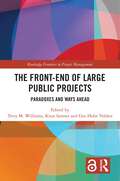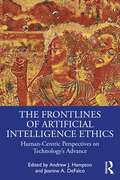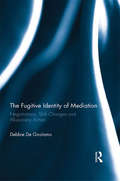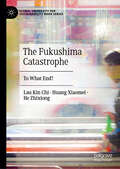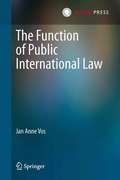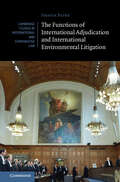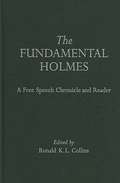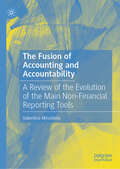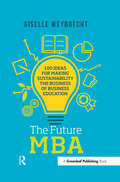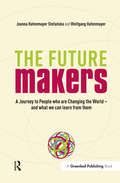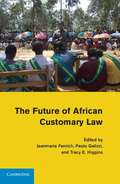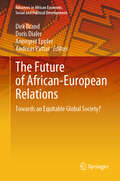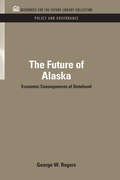- Table View
- List View
The French Civil Code (UT Austin Studies in Foreign and Transnational Law)
by Jean-Louis HalperinThis book charts the formation of the French Civil Code, examining both its public and private effects. From the sixteenth to the eighteenth century, French private law was very different in the various parts of the country. In northern and central France, there were as many as sixty-five general customs in force, as well as over three hundred local customs, often differing from them in detail. As the feeling of nationhood grew, so did the idea of replacing the existing variety of laws by a single private law, possibly a code, common to all of France. 'A single body of law, called the Code Civil is to be created' proclaimed the Law of 21 March 1804, which was created by the amalgamation of thirty-six texts. The French Civil Code analyzes the Code using contemporary and modern sources, including the beautiful and concise extract from H.A.L. Fisher's History of Europe which gives an English historian's appraisal of Napoleon's contribution to the Code Civil. This text will appeal to all students of and those with an interest in international law.
The Frightful Stage
by Robert Justin GoldsteinIn nineteenth-century Europe the ruling elites viewed the theater as a form of communication which had enormous importance. The theater provided the most significant form of mass entertainment and was the only arena aside from the church in which regular mass gatherings were possible. Therefore, drama censorship occupied a great deal of the ruling class's time and energy, with a particularly focus on proposed scripts that potentially threatened the existing political, legal, and social order. This volume provides the first comprehensive examination of nineteenth-century political theater censorship at a time, in the aftermath of the French Revolution, when the European population was becoming increasingly politically active.
The Front-end of Large Public Projects: Paradoxes and Ways Ahead (Routledge Frontiers in Project Management)
by Terry M. WilliamsLarge public projects represent major complex investment and whilst there has been much written about how to develop, manage and deliver such projects, practice still does not match up with expectations. In this book, researchers from the Norwegian Concept Research Programme explore the paradoxes between theory and practice in collaboration with experts in the field of project governance. This book delves into the reality of large public projects, to show how they can be managing effectively and efficiently, recognising the realities of their context. It offers a range of practical conclusions as to the paradoxes of the governance and management of public projects. The international spectrum of authors draw their examples from the UK, Norway, Canada, France, Australia and the Netherlands. Bridging the gap between research, theory and practice, this book will benefit academics and researchers in the field of project management and corporate governance as well as those in the practice of public project governance, civil servants and industry practitioners.
The Frontlines of Artificial Intelligence Ethics: Human-Centric Perspectives on Technology's Advance
by Andrew J. HamptonThis foundational text examines the intersection of AI, psychology, and ethics, laying the groundwork for the importance of ethical considerations in the design and implementation of technologically supported education, decision support, and leadership training. AI already affects our lives profoundly, in ways both mundane and sensational, obvious and opaque. Much academic and industrial effort has considered the implications of this AI revolution from technical and economic perspectives, but the more personal, humanistic impact of these changes has often been relegated to anecdotal evidence in service to a broader frame of reference. Offering a unique perspective on the emerging social relationships between people and AI agents and systems, Hampton and DeFalco present cutting-edge research from leading academics, professionals, and policy standards advocates on the psychological impact of the AI revolution. Structured into three parts, the book explores the history of data science, technology in education, and combatting machine learning bias, as well as future directions for the emerging field, bringing the research into the active consideration of those in positions of authority. Exploring how AI can support expert, creative, and ethical decision making in both people and virtual human agents, this is essential reading for students, researchers, and professionals in AI, psychology, ethics, engineering education, and leadership, particularly military leadership.
The Fugitive Identity of Mediation: Negotiations, Shift Changes and Allusionary Action
by Debbie De GirolamoDespite much having been written about what mediation is, direct observations of commercial mediations are limited. This book grants an opportunity to observe mediation in action and also provides external commentary about the actions observed. The book approaches Mediation ethnographically as a social process that is informed by structures, rules and norms that colour the environment within which it operates. Through the ethnographic method, a process leading to negotiated order is examined, baring its elements, identifying its influences and studying the movement to order. The result is the reconceptualization of mediation. The mediator is invited into the negotiation as third party intervener. He creates the process of mediation, defining the process by his actions, which ultimately merges mediator with process. This book provides a window to the lived experience of participants to mediation: it explores their understandings of and interactions within a process they have experienced together and demonstrates how mediation is a process inextricably linked to negotiation. The Fugitive Identity of Mediation will be of interest to scholars, mediators, parties who participate in the process, and to those active in public policy discourse.
The Fukushima Catastrophe: To What End? (Global University for Sustainability Book Series)
by Kin Chi Lau Huang Xiaomei He ZhixiongBased on a variety of interviews with residents, farmers, scientists, journalists, and activists who have been affected by the Fukushima catastrophe, the authors underscore the personal, political, and humanitarian impacts in testimonies, science, and photos. The book engagingly addresses diverse issues that continue to haunt and persist and calls for collective responsibility to deal with the devastating environmental, economic, and social consequences of nuclear energy. The book offers a critique of the violent history of modernism and the supremacy of science that has been articulated into all forms of social injustice and ecological injustice.
The Function of Public International Law
by Jan Anne VosThis book addresses fundamental aspects of the concept of public international law in both theory and practice. The argument developed by the author is that, underlying the traditional, horizontal, structure of public international law, a vertical structure of the concept of law may be discerned. This vertical structure is seen unfolding into two, mutually exclusive, frameworks: a framework of obligation, accounting for obligations, and a framework of authorization, accounting for rights. The problem then arising is that a concept of public international law which only admits either rights or obligations cannot be regarded as coherent. The author, however, takes and substantiates the position that coherence can be achieved by suppressing the mutual exclusivity of both frameworks. This move paves the way to formulating the function of public international law in terms of the constituting of international society. Since in public international law the theoretical aspects profoundly affect practice, this book is not only of interest to academics, but also for practitioners, such as officials of foreign offices and international institutions.
The Function of Public International Law
by Jan Anne VosThis book addresses fundamental aspects of the concept of public international law in both theory and practice. The argument developed by the author is that, underlying the traditional, horizontal, structure of public international law, a vertical structure of the concept of law may be discerned. This vertical structure is seen unfolding into two, mutually exclusive, frameworks: a framework of obligation, accounting for obligations, and a framework of authorization, accounting for rights. The problem then arising is that a concept of public international law which only admits either rights or obligations cannot be regarded as coherent. The author, however, takes and substantiates the position that coherence can be achieved by suppressing the mutual exclusivity of both frameworks. This move paves the way to formulating the function of public international law in terms of the constituting of international society. Since in public international law the theoretical aspects profoundly affect practice, this book is not only of interest to academics, but also for practitioners, such as officials of foreign offices and international institutions.
The Functions of International Adjudication and International Environmental Litigation (Cambridge Studies in International and Comparative Law)
by Joshua PaineThis book uses environmental disputes as a focus to develop a novel comparative analysis of the functions of international adjudication. Paine focuses on three challenges confronting international tribunals: managing change in applicable legal norms or relevant facts, determining the appropriate standard and method of review when scrutinising State conduct for compliance with international obligations, and contributing to wider processes of dispute settlement. The book compares how tribunals manage these challenges across four key sites of international adjudication: adjudication in the World Trade Organization and under the United Nations Convention on the Law of the Sea, International Court of Justice litigation, and investment treaty arbitration. It shows that while international tribunals perform several key functions in the contemporary international legal order, they are subject to significant constraints. Paine makes a genuine addition to literature on the role of international adjudication in international law which will benefit academics, practitioners, and policymakers.
The Fundamental Concept of a Crime in International Criminal Law: A Comparative Law Analysis
by Iryna MarchukThis book examines the rapid development of the fundamental concept of a crime in international criminal law from a comparative law perspective. In this context, particular thought has been given to the catalyzing impact of the criminal law theory that has developed in major world legal systems upon the crystallization of the substantive part of international criminal law. This study offers a critical overview of international and domestic jurisprudence with regard to the construal of the concept of a crime (actus reus, mens rea, defences, modes of liability) and exposes roots of confusion in international criminal law through a comprehensive comparative analysis of substantive criminal laws in selected legal jurisdictions.
The Fundamental Holmes
by Ronald K. CollinsNo figure stands taller in the world of First Amendment law than Oliver Wendell Holmes, Jr. This is the first anthology of Justice Holmes's writings, speeches and opinions concerning freedom of expression. The book contains eight original essays designed to situate Holmes's works in historical and biographical context. The volume is enriched by extensive commentaries concerning its many entries, which consist of letters, speeches, book excerpts, articles, state court opinions and U.S. Supreme Court opinions. The edited materials - spanning Holmes's 1861-1864 service in the Civil War to his 1931 radio address to the nation - offer a unique view of the thoughts of the father of the modern First Amendment. The book's epilogue, which includes a major discovery about Holmes's impact on American statutory law, explores Holmes's free speech legacy. In the process, the reader comes to know Holmes and his jurisprudence of free speech as never before.
The Fundamentals of Ethics (2nd Edition)
by Russ Shafer-LandauIn The Fundamentals of Ethics, Second Edition, author Russ Shafer-Landau employs a uniquely engaging writing style to introduce students to the essential ideas of moral philosophy. Offering more comprehensive coverage of the good life, normative ethics, and metaethics than any other text of its kind, this book also addresses issues that are often omitted from other texts, such as the doctrine of doing and allowing, the doctrine of double effect, ethical particularism, the desire-satisfaction theory of well-being, and moral error theory. Shafer-Landau carefully reconstructs and analyzes dozens of arguments in depth, at a level that is understandable to students with no prior philosophical background. NEW TO THE SECOND EDITION: * Discussion questions at the end of every chapter provide students with immediate ways to test their understanding of the material * New, real-life extended examples reinforce the importance of the theories discussed in Chapters 4, 7, 9, 10, 14, 15, and 19 * Greatly expanded coverage of moral rights (in Chapter 8) and of membership in the moral community (in Chapter 9) * A new discussion of skepticism about morality in the Introduction * An Instructor's Manual and Testbank on CD and a Companion Websiteatwww. oup. com/us/shafer-landau Ideal for courses in introductory ethics and contemporary moral problems, this book can be used as a stand-alone text or with the author's companion reader,The Ethical Life: Fundamental Readings in Ethics and Moral Problems,Second Edition, which offers original readings on ethical theory and contemporary moral problems.
The Fundamentals of Ethics (Fourth Edition)
by Russ Shafer-LandauIn The Fundamentals of Ethics, Fourth Edition, author Russ Shafer-Landau employs a uniquely engaging writing style to introduce students to the essential ideas of moral philosophy. Offering more comprehensive coverage of the good life, normative ethics, and metaethics than any other text of its kind, this book also addresses issues that are often omitted from other texts, such as the doctrine of doing and allowing, the doctrine of double effect, ethical particularism, the desire-satisfaction theory of well-being, moral error theory, and Ross's theory of prima facie duties. Shafer-Landau carefully reconstructs and analyzes dozens of arguments in depth, at a level that is understandable to students with no prior philosophical background. Ideal for courses in introductory ethics and contemporary moral problems, this book can be used as a stand-alone text or with the author's companion reader, The Ethical Life: Fundamental Readings in Ethics and Moral Problems, Fourth Edition.
The Fundamentals of Ethics (Third Edition)
by Russ Shafer-LandauThis engaging book introduces students to the essential ideas of moral philosophy. Offering more comprehensive coverage of the good life, normative ethics, and metaethics, this book also addresses issues that are often omitted from other texts such as the doctrine of doing and allowing, the doctrine of double effect, ethical particularism, the desire-satisfaction theory of well-being, and moral error theory.
The Funeral of a Giraffe: Seven Stories
by Taeko Tomioka Kyoko Iriye Selden Noriko MizutaA collection of short stories by scriptwriter-poet turned fiction writer Taeko Tomioka. Taeko deconstructs the discourse of the nuclear family and heterosexuality in gendered Japanese culture. Her stories focus on ordinary people unfettered by introspection or a search for life's ultimate meaning.
The Fusion of Accounting and Accountability: A Review of the Evolution of the Main Non-Financial Reporting Tools
by Valentina MinutielloIn recent decades, a growing awareness of companies’ important role within society emerged. Companies are considered accountable for their actions and their commitment to sustainability has become essential. Sustainability is a critical success factor and a source of competitive advantage that guarantees survival over time. The process of change necessarily passes through corporate disclosure: consequently, many businesses have begun to incorporate environmental and social issues in their reports to demonstrate their commitment. This trend highlights the need to systematize the main non-financial reporting tools available to companies. In light of these premises, this book investigates the topic of non-financial disclosure by analyzing and comparing the main reporting tools used. It also discusses three case studies as practical examples of the implementation of Sustainability or Integrated Reporting. The different case studies represent a useful tool for comparing the different types of non-financial reports and provide a guide for companies in the process of implementing and drafting a non-financial report.
The Futilitarians: Our Year of Thinking, Drinking, Grieving, and Reading
by Anne GislesonRecommended Summer Reading -- Louise Erdrich, New York TimesA memoir of friendship and literature chronicling a search for meaning and comfort in great books, and a beautiful path out of griefAnne Gisleson had lost her twin sisters, had been forced to flee her home during Hurricane Katrina, and had witnessed cancer take her beloved father. Before she met her husband, Brad, he had suffered his own trauma, losing his partner and the mother of his son to cancer in her young thirties. "How do we keep moving forward," Anne asks, "amid all this loss and threat?" The answer: "We do it together." Anne and Brad, in the midst of forging their happiness, found that their friends had been suffering their own losses and crises as well: loved ones gone, rocky marriages, tricky childrearing, jobs lost or gained, financial insecurities or unexpected windfalls. Together these resilient New Orleanians formed what they called the Existential Crisis Reading Group, jokingly dubbed "The Futilitarians." From Epicurus to Tolstoy, from Cheever to Amis to Lispector, each month they read and talked about identity, parenting, love, mortality, and life in post-Katrina New Orleans, gatherings that increasingly fortified Anne and helped her blaze a trail out of her well-worn grief. Written with wisdom, soul, and a playful sense of humor, The Futilitarians is a guide to living curiously and fully, and a testament to the way that even from the toughest soil of sorrow, beauty and wonder can bloom.
The Future Loves You: How and Why We Should Abolish Death
by Dr Ariel Zeleznikow-JohnstonA brilliant young neuroscientist explains how to preserve our minds indefinitely, enabling future generations to choose to revive usJust as surgeons once believed pain was good for their patients, some argue today that death brings meaning to life. But given humans rarely live beyond a century – even while certain whales can thrive for over two hundred years – it’s hard not to see our biological limits as profoundly unfair. No wonder then that most people nearing death wish they still had more time.Yet, with ever-advancing science, will the ends of our lives always loom so close? For from ventilators to brain implants, modern medicine has been blurring what it means to die. In a lucid synthesis of current neuroscientific thinking, Zeleznikow-Johnston explains that death is no longer the loss of heartbeat or breath, but of personal identity – that the core of our identities is our minds, and that our minds are encoded in the structure of our brains. On this basis, he explores how recently invented brain preservation techniques now offer us all the chance of preserving our minds to enable our future revival.Whether they fought for justice or cured diseases, we are grateful to those of our ancestors who helped craft a kinder world – yet they cannot enjoy the fruits of the civilization they helped build. But if we work together to create a better future for our own descendants, we may even have the chance to live in it. Because, should we succeed, then just maybe, the future will love us enough to bring us back and share their world with us.
The Future MBA: 100 Ideas for Making Sustainability the Business of Business Education (The Principles for Responsible Management Education Series)
by Giselle WeybrechtThe Future MBA brings together 100 ideas on how to rethink management education in order to embed sustainability. This book acts as a creative toolkit for individuals working in management education on how to design new and innovative products, services, and experiences for the business school community with a focus on sustainability. What if we took a moment to stand back and look at the bigger picture? What would the business school of the future look like? Rather than a roadmap, the 100 ideas presented in this book are meant to be a source of inspiration in responding to these questions. Some ideas could be put into practice tomorrow, some would require a complete reassessment of the way we view business education, and others are meant to encourage more ideas… and more action, to turn management education into a key player in moving the sustainability agenda forward.
The Future Makers: A Journey to People who are Changing the World – and What We Can Learn from Them
by joanna Hafenmayer wolfgang HafenmayerAre you looking for sense and meaning in your work? Would you like to be successful but expect more in the way of reward and fulfilment than just a paycheque? The Future Makers offers 23 encouraging responses to these questions. It tells the diverse stories of people from around the world who have made a sustainable mark on the world through their careers: from an American financial market specialist to tree planters in Africa; from Japanese environmental experts to dancers in Argentina. The Future Makers are people who make the world a better, more beautiful and livable place for current and coming generations. The Hafenmayers present these inspiring stories in an accessible, entertaining and thoughtful way. But they also do far more. The book presents a toolkit on how you can forge a career that has a positive impact on the world. This step-by-step process has already had a life-changing impact on readers of the original German edition. It is packed with helpful suggestions for personal development and reorientation – for a work life that will make you happier and deeply satisfied. The Future Makers takes you on a journey to people whose values and visions aren't compartmentalized into corners of their lives. They live their dreams every day. This book will show you how you can do the same.
The Future of African Customary Law
by Jeanmarie Fenrich Paolo Galizzi Tracy E. HigginsCustomary laws and traditional institutions in Africa constitute comprehensive legal systems that regulate the entire spectrum of activities from birth to death. Once the sole source of law, customary rules now exist in the context of pluralist legal systems with competing bodies of domestic constitutional law, statutory law, common law, and international human rights treaties. The Future of African Customary Law is intended to promote discussion and understanding of customary law and to explore its continued relevance in sub-Saharan Africa. This volume considers the characteristics of customary law and efforts to ascertain and codify customary law, and how this body of law differs in content, form, and status from legislation and common law. It also addresses a number of substantive areas of customary law including the role and power of traditional authorities; customary criminal law; customary land tenure, property rights, and intestate succession; and the relationship between customary law, human rights, and gender equality.
The Future of African-European Relations: Towards an Equitable Global Society? (Advances in African Economic, Social and Political Development)
by Doris Dialer Dirk Brand Annegret Eppler Andreas PattarThis book explores the future of African-European relations with a focus on achieving equity in a global context. Drawing on the expertise of policymakers, institutional stakeholders, scholars, and practitioners from both the global south and the global north, this contributed book offers unique insights into successful cooperation strategies between Africa and Europe. By offering case studies and clear perspectives, the book covers topics such as the implementation of public policies, the role of culture and languages, judicial independence, e-governance, technical cooperation and project management, energy crisis, economic growth, and global health. Moving beyond conventional development rhetoric and geopolitical divides, this book creates a common narrative for fostering an equitable global society. This book goes beneath the general development rhetoric, exploring the underlying dynamics of African-European societies, their local practices, and cultures. It also critically examines the post-pandemic global health architecture and the energy crisis from an African-European perspective. Additionally, it includes a dedicated chapter on the influential role of culture in shaping African-European relations.
The Future of Aging
by Gregory M. Fahy L. Steven Coles Michael D West Stephen B. HarrisJust as the health costs of aging threaten to bankrupt developed countries, this book makes the scientific case that a biological "bailout" could be on the way, and that human aging can be different in the future than it is today. Here 40 authors argue how our improving understanding of the biology of aging and selected technologies should enable the successful use of many different and complementary methods for ameliorating aging, and why such interventions are appropriate based on our current historical, anthropological, philosophical, ethical, evolutionary, and biological context. Challenging concepts are presented together with in-depth reviews and paradigm-breaking proposals that collectively illustrate the potential for changing aging as never before. The proposals extend from today to a future many decades from now in which the control of aging may become effectively complete. Examples include sirtuin-modulating pills, new concepts for attacking cardiovascular disease and cancer, mitochondrial rejuvenation, stem cell therapies and regeneration, tissue reconstruction, telomere maintenance, prevention of immunosenescence, extracellular rejuvenation, artificial DNA repair, and full deployment of nanotechnology. The Future of Aging will make you think about aging differently and is a challenge to all of us to open our eyes to the future therapeutic potential of biogerontology.
The Future of Alaska: Economic Consequences of Statehood (RFF Policy and Governance Set)
by George RogersThis book is both a discussion of key decisions Alaskans must make in coming years and a case study of problems of public finance and policy that accompany shifts in power. Originally published in 1962
The Future of Antarctica: Scenarios from Classical Geopolitics (Springer Polar Sciences)
by Marcus Haward Jeffrey McGee David EdmistonAs global great power competition intensifies, there is growing concern about the geopolitical future of Antarctica. This book delves into the question of how can we anticipate, prepare for, and potentially even shape that future? Now in its 60th year, the Antarctic Treaty System has been comparatively resilient and successful in governing the Antarctic region. This book assesses how our ability to make accurate predictions about the future of the Antarctic Treaty System reduces rapidly in the face of political and biophysical complexity, uncertainty, and the passage of time. This poses a critical risk for organisations making long-range decisions about their policy, strategy, and investments in the frozen south. Scenarios are useful planning tools for considering futures beyond the limits of standard prediction. This book explores how a multi-disciplinary focus of classical geopolitics might be applied systematically to create scenarios on Antarctic futures that are plausible, rigorous, and robust. This book illustrates a pragmatic, nine-step scenario development process, using the topical issue of military activities in Antarctica. Along the way, the authors make suggestions to augment current theory and practice of geopolitical scenario planning. In doing so, this book seeks to rediscover the importance of a classical (primarily state-centric) lens on Antarctic geopolitics, which in recent decades has been overshadowed by more critical perspectives. This book is written for anyone with an interest in the rigorous assessment of geopolitical futures - in Antarctica and beyond.


